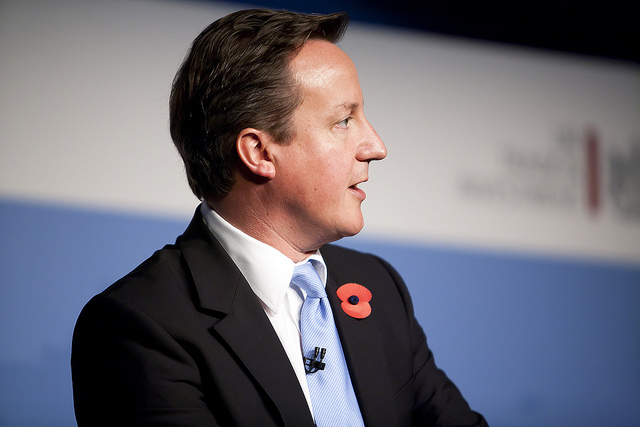David Cameron has promised to deliver a programme that would enable some UK employees to undertake paid volunteering leave
If the Conservative government stays in power they would offer up to 15 million workers three days paid leave a year to undertake voluntary work. According to the Tories volunteering has increased significantly over the past five years.
Employees who would be able to take advantage of the scheme include those who work in the public sector and at some large firms.
Labour was quick to downplay the pledge, arguing that it was a “re-announcement” of a previous scheme from 2008.
The volunteering plan would see a new law passed that would require public sector employers and companies with more than 250 employees to give staff up to three days a year to undertake voluntary work.
The move harks back to the last election in 2010, during which the Conservatives focused on the idea of the Big Society. The scheme eventually flopped, making it a little difficult to know whether this new plan would go the same way or be a success.
Additionally, firms would have to organise and pay for the scheme out of their own pocket. As a result businesses are likely be unhappy at having to implement it. Front line public service, already struggling under the crushing demands may also find it hard to cover staff.
Prime Minister and leader of the Conservatives David Cameron said the scheme was “the clearest demonstration of the Big Society in action” and said it represented a “double win” for employees and communities.
Communities Secretary Eric Pickles claimed it would “enhance productivity”. However, he also suggested employers could opt out of the scheme, leading to the question is it just an empty pledge if companies do not have to offer it to employees?
He said: “Nobody is forcing anyone to volunteer. Nobody is forcing companies to organise this volunteering if it causes problems to the company.”
“We expect people to have a bit of give-and-take on this as we expect people to have a bit of give-and-take with regard to annual leave.”
Pickles also said the scheme would not prove a financial burden for smaller firms nor would it be a logistical headache for organisations such as the NHS.
“It would be worked out according to patterns of work and would be worked out to ensure it did not cause inconvenience to the health service.
He added: “It is no different from annual leave. These companies will get a benefit from having an engaged workforce and are going to have the advantage that they are putting something back into society.”
Labour’s civil society spokeswoman Lisa Nandy said: “If just half of public sector workers took this up it would be the time equivalent of around 2,000 nurses, 800 police and almost 3,000 teachers.”
The Conservatives have also promised to freeze some rail fares until 2020. Given the monumental cost of travelling by train this will undoubtedly be welcome news for those who regularly use the rail network. The Conservatives said freezing fares would save the average commuter around £400 between now and 2020.
However, Labour pointed out that rail fair had risen by 20 per cent since 2010, when the Tories first took power. Shadow Transport Secretary Michael Dugher said the plan was “unfunded, uncosted and frankly totally unbelievable”.
This week on the campaign trail the Labour party also promised to protect neighbourhood policing in England and Wales and prevent officer numbers from being cut if they are given the opportunity to lead the government.
Another pledge put forward today comes from the Lib Dems in the form of the “Help to Rent”. The scheme would allow under-30s to borrow the money for a deposit from the government. The maximum amount that could be given is £2,000 in London and £1,500 across the rest of England. Tenants would need to be between 18 and 30, in paid employment, and not seeking social housing. The loan would need to be paid back within two years.
Deputy Prime Minister and Leader of the Lib Dems Nick Clegg said: “It’s simply unfair that thousands of hard-working young people still have to live in the same bedroom they lived in when children.
“When you get your own job, you want to stand on your own two feet, have your own space, and not have to rely on the bank of mum and dad.
“Our scheme removes this barrier to young people’s independence, providing access to up to £2,000 towards their tenancy deposit so they can fly the nest and rent their own space.”
Trident, the UK’s nuclear deterrent programme, was also at the forefront of the campaign this week. The highly contentious issue pitted Labour and the Conservatives against one another in an epic smackdown that saw Defence Secretary Michael Fallon resort to name calling. In a move Labour said had “dragged politics into the gutter”, Fallon said Ed Miliband had “stabbed his own brother in the back” and was “willing to stab the UK in the back” by getting into bed with the SNP over Trident. Most surprisingly was the fact Cameron came out in support of Fallon’s statement, despite the playground antics from his colleague. It might be naïve, but one would expect better from the leader of the country.
In fact, it has been a fairly bad week for politics all round. Patricia Culligan, UKIP candidate for Eastleigh, found herself in hot water after tweeting that Lib Dem candidate for Liverpool Riverside Paul Childs “deliberately became HIV positive”. She bemoaned the cost of care, stating it was very costly. She later apologised and deleted the tweet, but the comment caused something of a furore, particularly in the Lib Dem camp.
In a lesser crime, Clegg also found himself defending the actions of his party after a flyer produced for candidate Dan Rogerson failed to mention the party he was affiliated with. The only mention was in the address to send donations.











